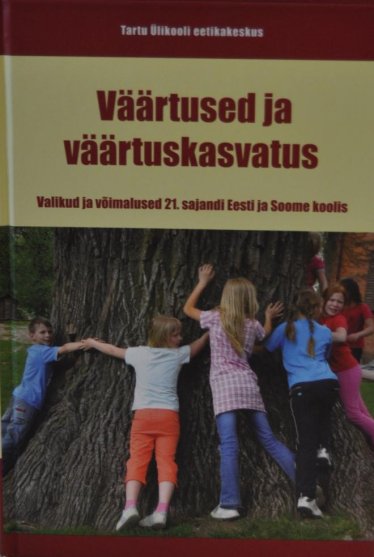Values and Value Education: The Choices and Chances of Estonian and Finnish Schools in the 21st century

Editors Margit Sutrop, Pille Valk, Katrin Velbaum
Content Editor Triin Pisuke
Copy editing Kadri Lutt, Kristi Lõuk, Triin Pisuke, Aire Vaher
Language Editor Tiina Voolaid
Designer Merle Moorlat
Publisher Centre for Ethics, University of Tartu
Published by Eesti Keele Sihtasutus/Estonian Language Foundation
Language: Estonian
Published with the support of the Estonian Ministry of Education and Research
Values and Value Education. The Choices and Chances of Estonian and Finnish Schoolsin the 21st Century (est Väärtused ja väärtuskasvatus. Valikud ja võimalused 21. sajandi Eesti ja Soome koolis) was published by the Centre for Ethics in June 2009.
The book is dedicated to value education in Estonia and Finland. The purpose of the book is to recognise the importance of values in education, and to introduce the experiences of Estonian and Finnish schools in value education and the choices that the Estonian schools face at present. Recognition of values in the learning environment is an important step towards making a school that pays attention to the character of each student and provides a safe environment for all students and teachers.
Value education has only recently become a topic of interest in Estonia. Unlike the United States, Denmark and Finland, where values are often the basis for the whole curriculum and value education programmes are highly advanced, Estonian schools are taking their first steps in this area. Nonetheless, there are already several schools in Estonia, such as Pärnu Sütevaka Humanitaargümnaasium, Rocca al Mare Kool, Viimsi Keskkool, Laeva Põhikool and Vanalinna Hariduskolleegium, which concentrate on character development in addition to teaching academic knowledge.
On 3–4 December 2008, the Centre for Ethics in collaboration with the Estonian Ministry of Education, the Finnish Institute in Estonia, the Embassy of Finland in Estonia and the Working Group of Religious Studies of the Cultural Theory Centre, organised the conference “Values and Value Education: The Choices and Chances of Estonian and Finnish Schools in the 21st century”. The book presents the issues, ideas and proposals discussed during the conference.
The book is rich in content. All presentations given at the conference are included, in addition to summaries of group discussions and plenary sessions. The book also contains texts written by Estonian schoolteachers who are already involved in value education in their schools, and by representatives of values-oriented organizations such as European Youth and Junior Achievement Estonia. Each shares their experience and provides a useful example for all other schools and organisations. The book also includes a survey of value discourse in Estonian kindergartens, conducted by Halliki Harro-Loit (Senior Lecturer at the Institute of Media and Communication at the University of Tartu), and a survey about teachers’ motivation to engage in value education, conducted by Laura Lilles (employee of the Centre for Ethics) and Pille Valk (Senior Lecturer at the Faculty of Theology). The book also contains the text of the National Programme “Value Development in Estonian Society 2009–2013”, of which programme the book forms a part.
Authors: Mai Gross, Halliki Harro-Loit, Seppo Helakorpi, Erkki Jaanhold, Lembit Jakobson, Külli Kalamees-Pani, Marit Kannelmäe-Geerts, Tiiu Kuurme, Andres Laanemets, Tõnis Lukas, Endla Lõkova, Hannele Niemi, Kersti Nigesen, Jaan Paaver, Gunnar Polma, Anu Rannus, Inge Raudsepp, Rein Rebane, Viive-Riina Ruus, Andu Rämmer, Sari Sarkomaa, Piret Siivelt, Margit Sutrop, Toomas Tenno, Tiina Teppo, Leelo Tiisvelt, Liivi Türbsal, Kristiine Vahtramäe, Pille Valk, Epp Vodja, Külli Volmer, Varro Vooglaid.


